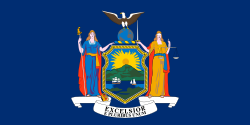 | |
| Department overview | |
|---|---|
| Jurisdiction | New York |
| Department executive | |
| Key document | |
The New York State Executive Department of the New York state government serves as the administrative department of the Governor of New York. [1] This department has no central operating structure; it consists of a number of divisions, offices, boards, commissions, councils, and other independent agencies that provide policy advice and assistance to the governor and conduct activities according to statute or executive order. Its regulations are compiled in title 9 of the New York Codes, Rules and Regulations .
